- Home
- Richard Flanagan
The Narrow Road to the Deep North Page 23
The Narrow Road to the Deep North Read online
Page 23
That’s my belt?
Saris. Apparently. Some time ago.
The colonel smiled.
It’s good that they help keep my pants on for a change. Here, he said, indicating his shorts with his elbows as he kept washing his hands.
The orderly ran the makeshift rope around his shorts and knotted it on one side, giving the tall surgeon’s narrow hips a buccaneering dash.
Named after the noted Melbourne gangster, because of both his surname and a dark charm—emphasised by damp marsupial eyes, at once alert and vulnerable, and underlined by a pencil moustache—the once sleek Squizzy Taylor was now very thin, a form that lent him a villainous look he had never before had, further adding to the aptness of his nickname. His background as a suburban doctor in Adelaide was as plain as his looks were exotic. Other than what he had learnt assisting Evans, he knew surgery only from his medical training and anecdote.
Colonel?
Amputate, Dorrigo Evans said without looking up from his hands. Again.
Dorrigo, Squizzy Taylor said. You’ve looked at the stump?
I know.
There’s nothing left to cut off.
Dorrigo felt his hands crushing each other. They had to be clean.
I know. You can—Dorrigo Evans began, and then hesitated.
He wrung his hands harder. Could he?
For Christ’s sake, Jimmy, he snapped, this fucking water’s more precious than single malt. It’s not for irrigation. Go slowly with it, I said.
He’ll die from the shock, Dorrigo.
He’ll die if we don’t. It’s gangrene. There’s . . . There is a chance if we amputate at the hip.
Is there? Squizzy Taylor said. Even in the most modern hospitals hip disarticulation only kills people. You’re just cutting through too much of the body. Out here, it’s pointless.
How much anaesthetic have we got?
Enough.
I assisted on a hip disarticulation once, Dorrigo said. In Sydney, back in thirty-six. Old Angus MacNamee did the job. The best.
Did he live?
She. An Aboriginal woman. For a day. Maybe two. I can’t recall exactly.
Why don’t you just go for a very high thigh amputation? There’s a chance then.
The gangrene is too high.
I am not a surgeon. But it’s not that high. Take the leg off where the tourniquet is.
Either way, high up on the thigh or at the hip, there’s nowhere left to put any tourniquet and he bleeds to death. There’s no fucking leg left, Squizzy. That’s the problem.
If I can push down hard with something round and flat about here, said Taylor, prodding around his own groin with his fingers, feeling the arteries, the flesh, the span of the dilemma. Here, he said, pushing two fingers into his groin. Here—on the femoral artery, that might stop the blood enough.
It might not.
It might not.
Maybe something like a spoon with the handle bent around? That might.
Might.
Might.
That’d do the job. And hopefully staunch the flow enough that you can work. He’ll still bleed. But you get the stump off, clamp the arteries and then sew up. He’ll still be bleeding but not so badly he’ll die.
I’ll have to go quickly.
You were never a man to dawdle.
Jack Rainbow’s wasted body was trembling slightly. A low hiss pulsed in and out of his mouth.
Okay, said Dorrigo Evans, shaking his hands dry. He sent Jimmy Bigelow for a tablespoon and went back to the bamboo table.
We’re just going to whittle that leg back a bit more, Jack, cut that stinking gangrene away and—
I’m cold, said Jack Rainbow.
18
DORRIGO EVANS LOOKED at the gaunt face, grey as beef dripping, with white stubble stiff as fuse wire, the large possum eyes, the snub nose and dirty freckles.
Get a blanket, Dorrigo Evans said.
You got a Pall Mall, doc?
I’m afraid not, Jack. But after, I’ll make sure you get a good smoke.
Nothing like a Pall Mall to warm you up, doc.
And Jack laughed and coughed and shook once more.
Van Der Woude arrived with his homemade anaesthetic. Jimmy Bigelow returned with a tablespoon from the kitchen and a soup ladle as backup. The candles and two kerosene lamps were lit, but the mass of them only seemed to accentuate the darkness of the hut. An orderly switched on a torch.
Not yet, Dorrigo Evans said. We’ve got no spare batteries. Wait till I ask.
He motioned Jimmy Bigelow and Squizzy Taylor to stand with him alongside the table and slide their hands under Jack Rainbow.
On the count of three, gentlemen.
They rolled Jack Rainbow over. When Squizzy Taylor slid the needle into Jack’s spine, Jack made a plunging noise like a drain being suddenly emptied. They began drip-feeding him the anaesthetic. Wat Cooney, a cook of impossibly small proportions with ears that looked as if stolen from a bag of brussel sprouts, arrived with the meat saw from the kitchen.
Van Der Woude’s concoction was good but variable in strength. Jack Rainbow lost feeling quickly and they prepared for the amputation, boiling the kitchen saw and the few surgical instruments they had. When all was finally ready, Dorrigo Evans gave the signal they were about to begin. The drip was removed and Jack Rainbow was rolled back around.
We will be as quick as we can, Dorrigo Evans said. copyright procedure. The key here is to keep bleeding to an absolute minimum. Hold him, he said, turning to Jimmy Bigelow and Wat Cooney. Spoon ready? he asked Squizzy Taylor. Taylor raised the now bent spoon in a mock salute.
Charge the windmill, Dorrigo Evans said.
He took a deep breath. Taylor pushed the spoon head gently but with growing firmness into the base of Jack Rainbow’s wasted belly.
Torch, Dorrigo Evans said. Jimmy Bigelow came forward and shone the torch on the stump.
There was noise from the general hospital huts but it was almost immediately drowned out by Jack’s screaming as Dorrigo Evans began cutting away his leg stump. The stench of the dead flesh was so powerful it was all he could do not to vomit. But Jack Rainbow’s screams confirmed to Dorrigo Evans that he was doing what he had to do: cut into living flesh.
An orderly came running into the operating hut.
What do you want? Dorrigo Evans asked, not looking up.
The Goanna’s taken Darky Gardiner out of the hospital.
What?
We couldn’t stop him. They dragged him out by his arms. Something about men missing up on the Line. There’s a tenko happening now. They’re going to punish him.
Later, Dorrigo Evans said, his face down almost at the level of Jack Rainbow’s stinking remnant of leg, concentrating on the job at hand.
Major Menadue said only you can stop them.
Later.
When he severed the femoral artery it bled badly, but not wildly.
Clamps, Dorrigo Evans said. Nothing I can do about it at the moment. Fucking yellow bastards. Clamps? Bastards. Clamps!
He clamped the femoral artery but the tissue just broke away and the fleshy tube spat blood out over the table and then continued pumping blood.
Push harder, he said to Taylor. He was thinking how he should have been there to stop such an outrage. He thought also of the broken still, the need to buy more anaesthetic from the Thai traders, and how in future he must always make the first amputation as low as possible to allow for such future horrors as this.
He clamped the femoral artery a second time, and for a second time it fell away, and he had to push up into the stinking dead flesh and clamp again. He stopped, waited. This time it held.
Okay, he said, okay.
He cut away more flesh. Within a minute he had cut off the rest of the rotting meat. There was bleeding, but Taylor was right, it was not too much, there had been enough leg left, just enough to amputate. For the first time in an hour he relaxed a little.
Spoon away? Taylor asked.
Not yet, Dorrigo Evans said. Pointing to the rotting meat on the table, he said to Jimmy Bigelow, Get rid of it, for Christ’s sake.
Next Evans flensed enough skin to form a flap to cover the final wound. Then he neatly filleted the living leg muscles back from the bone, so that he could remove the bone higher up and the flesh could in time heal below and around it to form a tolerable stump.
Saw, he said.
An orderly handed him the kitchen meat saw. It was hard to get the traction he needed, so he worked with gentle small strokes, scoring the upper thighbone, seeking to avoid splinters and any further damage to the flesh. And soon enough a piece of bone the length of a finger dropped away.
The three men were now intensely focused on the operation. Dorrigo Evans set to work sewing up the femoral artery with a gut twine Van Der Woude had improvised out of a pig’s intestine casings. These had been cleaned, boiled and pared into threads, then cleaned and boiled again, then boiled a third time before the operation. Compared to surgical ligatures, they were coarse, but they held. But this time he was sewing into nothing, wetness, a blur of tissue and blood. The torchlight was dimming, and he concentrated with all his being on getting each suture in exactly the right place.
And then the bleeding stopped.
He had done it. He had managed to suture the artery, and Jack Rainbow would live. He realised he was breathing heavily. He smiled. He began to prepare the rest of the muscles and skin flap for binding over the bone stump. He looked up at Squizzy.
Spoon away, Major. Gently.
Squizzy Taylor lifted the spoon. Dorrigo Evans kept working, more slowly now, more carefully. Jack would live. He would save this man’s life. There was the recuperation to get through, the chance of infection. But his chances were now good. Not great, perhaps, but still good. He concentrated on doing the best job he could now, imagining a middle-aged Jack Rainbow with children, his stump on a cushion. Alive. Loved. And he knew that what he did was not pointless, without reason; that he had not failed.
Torch off, he said.
He was finished.
He stood up straight, rubbed his back, winked at Jimmy Bigelow and looked back down at the stump. It was a surprisingly neat job. He felt proud of his handiwork. He noticed a small seep of blood where he had just stitched the flaps of flesh together, but the orderly was cleaning the stump and wiped it away.
Dorrigo lit a cigarette, breathed in the welcome smoke deeply, and laughed.
A spoon, he said.
A bloody bent spoon, said Squizzy.
That’s one for The Lancet.
When he glanced back at Jack, a few fresh beads of blood had appeared on the stump.
Why aren’t you dressing and bandaging the stump? Dorrigo asked Wat Cooney, as he wiped away the blood a second time.
As if in answer, the blood almost as quickly reappeared. The stitched flaps were swelling, the small seepage was transforming into a persistent oozing, and then blood began to drip from every part of the wound. Wat Cooney looked up at Dorrigo in horror.
The stitches holding the femoral artery together must have given way, Squizzy Taylor said, giving words to a thought Dorrigo did not wish to have. For a moment he was frozen.
Spoon! he suddenly yelled.
What? asked Jimmy Bigelow, who was on the other side of the hut.
The ligatures are gone on the femoral artery. We’ve got to open it back up.
Squizzy Taylor ran back with the spoon.
Torch! Jimmy, torch! We’ve got half a minute.
For after half a minute, he knew, Jack Rainbow’s heart would have emptied his body of blood. Before he could get the spoon back in position Jack Rainbow’s body jolted.
Spoon!
Jack Rainbow’s body had gone into convulsions.
Spoon! Dorrigo Evans yelled.
Squizzy Taylor went to push the spoon down but couldn’t keep it pressed against the bucking body. Jimmy Bigelow switched the torch on and got back in position, but the torch dimmed further and then died altogether.
Torch! Dorrigo Evans was yelling. Where’s the fucking light?
The body was jumping wildly.
Hold him! Hold him down! Hard. Spoon! Hard! Hold the fucker!
I’m pushing as hard as I fucking can but the fucker won’t stop, yelled Squizzy Taylor.
Blood was everywhere, blood over the bamboo, blood over them, blood dripping oily lines in the dark mud below. It took a few more moments for Jimmy Bigelow and Wat Cooney to get a good grip of Jack Rainbow and hold him, but still that emaciated tiny body jolted up and down as if electricity were coursing through it, and their grips slipped in the blood that now seemed to grease everything.
The leg, said Dorrigo Evans. Get the leg!
But there was really no leg left to get, only a weirdly moving and bloody thing that seemed just to want to be left alone. The tiny piece of thigh that remained was now so slippery with blood that it was very difficult to work on, and in the dim light and the confusion of blood Dorrigo Evans was having trouble seeing anything clearly. The tremors eased then stopped, and he managed to find the sutures holding the flesh together so that he could get back to the femoral artery, but when he snipped them Jack Rainbow jolted again. Squizzy’s spoon slipped in the bloody slime, and blood spurted in a wild arc that reached as far as the foot of Jack Rainbow’s good leg.
He was frantically searching the muck of Jack’s stump with his fingers, trying to find something to stitch, pinching vaulting slime, groping pitching slop, there was nothing, nothing to stitch into, nothing that might hold the thread. The artery walls were wet blotting paper. There was, realised Dorrigo Evans, with a rising horror as the blood continued to pump out, as Jack Rainbow’s body went into a terrible series of violent fits, nothing he could do. But there must be, he told himself. Think! Think! Look!
With each galvanic jolt blood was spewing out in a small fountain. It was as if Jack Rainbow’s body were willingly pumping itself dry. Dorrigo Evans was trying to stitch as far up the artery as he could go, the blood was still galloping out, Squizzy Taylor was unable to staunch the flow, blood was everywhere, he was desperately trying to think of something that might buy some time but there was nothing. He was stitching, the blood was pumping, there was no light, the stitches kept ripping, nothing held.
Push harder, he was yelling to Squizzy Taylor. Stop the fucking flow.
But no matter how hard Squizzy Taylor pushed, still the blood kept surging, spilling over Dorrigo Evans’ hand and arm, running down into the Asian mud and the Asian morass that they could not escape, that Asian hell that was dragging them all ever closer to itself.
The convulsions gave way to shivering. Dorrigo Evans was pushing deeper into the stump, the flesh was tearing and falling away as he worked; his needle at one point hit the bone. He was trying to think, he was trying to find some way, he was trying not to give up hope when he heard Jack speak a few low words that were not much more than gasps and cracks of breath.
Big Fella?
Jack?
Will I die?
I think so.
Cold, he said. So fucken cold.
Dorrigo Evans kept steadily working on Jack’s stump, his bare feet ankle-deep in the bloody mud below the makeshift bamboo operating table, his outer calm a strange thing he knew he preserved at the moments of greatest inner turmoil. He kept looking for that piece of artery, trying to find something in his work to hold on to, unconsciously clawing at the mud with his toes.
And then finally he had it, and he worked with the utmost care and delicacy to make sure his work would hold and Jack live, and when it was done and he lifted his head he knew Jack had been dead for some minutes and no one had known how to tell him.
19
COLONEL KOTA FOUND the Korean sergeant ever more irritating. Everything about the guard seemed untrustworthy and unreliable. Even his affected way of walking and his exceedingly slow way of turning seemed somehow false. As he looked up and down the tangle of sleepers, rock, dirt,
irons and naked slaves working like cockroaches, Colonel Kota understood why Koreans could never be used as frontline troops.
While he inspected the railway works—the embankments and sidings, the great cuttings through rocky hills, grey limestone cliffs holding up black clouds, and the magnificent teak trestle bridges over jungle gorges, bowing like rainbows in the monsoon deluge—all he could think of was how he had not killed the prisoner back along the track, and how the Korean sergeant had witnessed his strange behaviour. And yet, even now, he could not remember the exact order of the haiku’s syllables. The Korean sergeant annoyed him immensely, seeking to please him with his affected smile, his ridiculous agreement with every comment Kota made, his boasting of the efficiency of their operation. Colonel Kota was convinced that behind every compliment was contempt, behind every agreement mockery, beneath every boast insolent superiority. On a hunch that he thought at best might embarrass the Korean and at worst annoy him, he ordered a head count of the prisoners for no reason other than that he could.
To the guards’ astonishment, the count came up nine short—nine prisoners missing. Alerted to this discovery, eight men mysteriously appeared at the second head count, held half an hour later. The hatchet-faced Japanese colonel demanded the eight men who had been hiding come forward to be punished, and that they reveal the identity and whereabouts of the ninth missing man.
When no one came forward, he ordered that the POW sergeant responsible for the gang be found and severely punished as an example. After some confusion, it was established that the ninth man was the sergeant, and that he was not on the Line but back in camp.
On returning to the camp late that afternoon, Colonel Kota gave Nakamura a dressing down, his rage driven by his own shame at having forgotten a haiku and thus having been unable to behead a prisoner—and this in front of a Korean guard. In turn deeply ashamed, the Japanese major found the Korean sergeant whose name he could never remember, slapped him hard a few times, got the name of the prisoner who was apparently—of all things—hiding out in the hospital, and ordered a parade to be called and the prisoner to be punished in front of the assembled POWs.

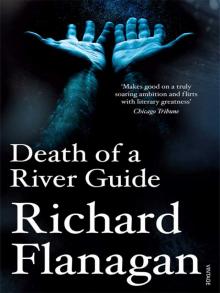 Death of a River Guide
Death of a River Guide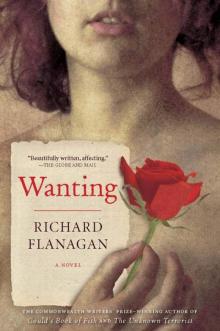 Wanting
Wanting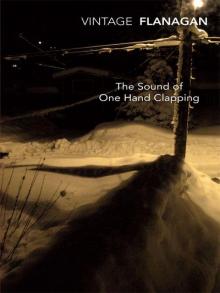 The Sound of One Hand Clapping
The Sound of One Hand Clapping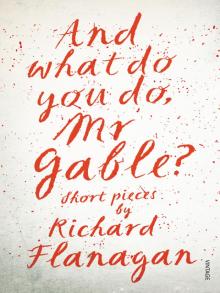 And What Do You Do Mr. Gable?
And What Do You Do Mr. Gable?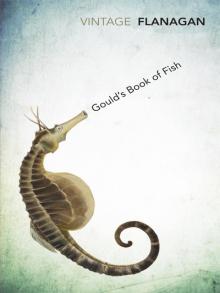 Gould's Book of Fish: A Novel in Twelve Fish
Gould's Book of Fish: A Novel in Twelve Fish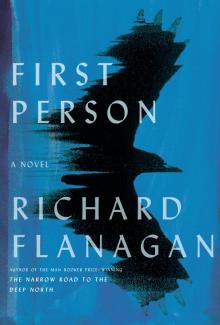 First Person
First Person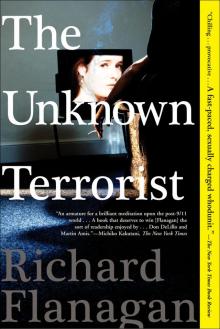 The Unknown Terrorist
The Unknown Terrorist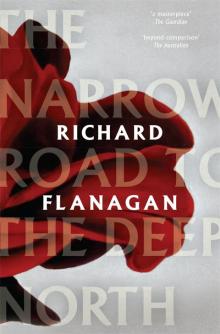 The Narrow Road to the Deep North
The Narrow Road to the Deep North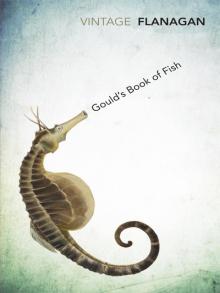 Gould's Book of Fish
Gould's Book of Fish